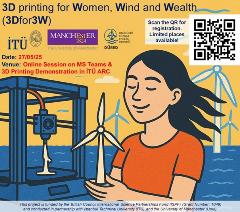Istanbul Technical University and the University of Manchester have joined forces on a groundbreaking international project titled, "3-D printing based innovative repair of recyclable turbine blades while fostering gender equality and sustainability in Türkiye's wind energy sector." This significant initiative is proudly supported by the British Council – International Science Partnerships Fund.
The project, which officially began in January 2025 and will run for 22 months, aims to develop cutting-edge solutions for repairing recyclable wind turbine blades using 3D printing technology. Beyond its technological advancements, a key focus of the project is to promote gender equality and sustainability within Türkiye's burgeoning wind energy sector.The collaborative team is led by Professor Paul Mativenga from the University of Manchester as the principal investigator, and Associate Professor Seher Eken from ITU Astronautical Engineering Department as the co-principal investigator. Researchers include Dr. Akın Atas from the University of Manchester, and Assistant Professor Oguzcan Inal from ITU Aeronautical Engineering Department, alongside Assistant Professor Kaan Yıldız from ITU Aviation Institute.The project has secured a total of £79,880 in funding, with ITU receiving a substantial share of £39,983.
In line with its objectives, an initial online meeting was held, followed by a 3D printer demonstration as part of an event titled "3-D printing for Women, Wind and Wealth (3Dfor3W)" on May 27, 2025. This event highlighted the project's commitment to its core themes of empowering women, advancing wind energy technology, and creating economic value.
This partnership underscores a shared vision for a more sustainable future and aims to make a significant impact on the efficiency and environmental footprint of the wind energy industry in Türkiye and beyond.
This project addresses these challenges by developing innovative repair methodologies for recyclable composite laminates using 3-D continuous fibre printing technology. 3-D printing technologies could provide repair patches with tailorable geometrical and mechanical properties to fulfil the structural requirements, while other inherent advantages of 3-D printing, such as reduced physical labour, virtually no sacrificial material and relatively low investment, could attract groups of various social and economic backgrounds, physical disadvantages and gender identities to get involved in the job market and wind energy sector. In addition, the 3-D pre-fabricated repair patches could lead to faster repair operations, hence reducing blade downtime, as it could replace the conventional repair process which involves a technician applying a repair operation manually by stacking several layers of composite material and curing them while being lassoed to the blade for the entire operation duration. Shorter operation times positively contribute to the technician’s safety since the offshore wind turbines are installed in open seas’ challenging environments.By leveraging Türkiye’s conducive investment environment and the UK’s technological advancements, the project seeks to accelerate the collaboration in offshore wind energy sector. Moreover, the project places a strong emphasis on fostering gender equality through initiatives like “3Dfor3W,” which connects women in engineering with professionals in the wind energy sector, providing networking and recruitment opportunities. By promoting inclusivity and diversity, the project aligns with the principles of Official Development Assistance (ODA), contributing to global efforts to combat climate change while promoting sustainable development. Through knowledge exchange, resource sharing, and the establishment of best practices, the project aims to create a positive impact not only in Türkiye but also on a global scale.”
